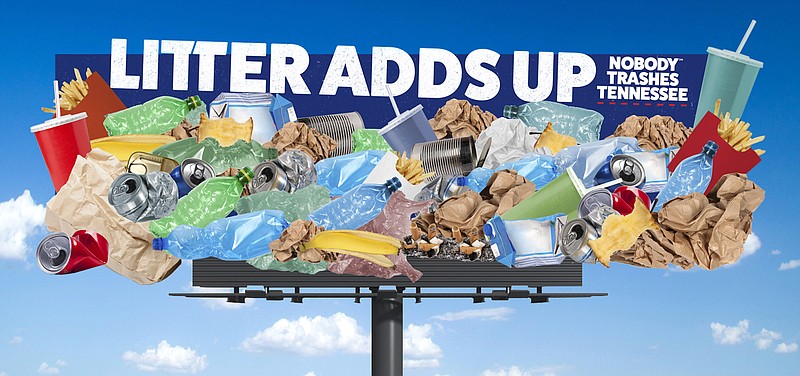More Info
nobodytrashestn.com
NASHVILLE - With an estimated 100 million pieces of trash on Tennessee roadways and more than $15 million spent a year by the state alone trying to clean up the mess, officials have launched a new multimedia litter prevention campaign.
Dubbed "Nobody Trashes Tennessee," the effort includes television spots and billboards through which Tennessee Department of Transportation officials hope to remind state motorists not to toss out their garbage or allow debris to fly off of trucks.
"From the Great Smoky Mountain region, to the Mississippi River, and every stretch of roadway in between, litter on our highways takes away from Tennessee's natural beauty," TDOT Commissioner John Schroer said in a statement. "It's not only an eyesore, but it costs TDOT more than $15 million a year to clean up."
According to state officials, while the amount of litter on state interstates, highways and roads is actually down 53 percent since 2006, there's still plenty out there.
Twenty-eight percent of litter remains classified as intentional, meaning it's deliberately tossed out onto roads, according to TDOT.
The remaining 72 percent is considered "negligent litter." That includes vehicle debris and trash flying out of uncovered pickup truck beds.
Regardless of whether it's deliberate or unintentional, littering is punishable under Tennessee law with fines of between $50 and $3,000.
In an effort to delve into the minds of Tennesseans and their attitudes about litter, state officials hired a polling firm that surveyed 1,001 Tennesseeans by telephone or via the internet to find out what the deal is.
Focus groups were later convened in Chattanooga, Knoxville, Nashville and Memphis to delve into some of the findings and seek effective ways to deliver messages about not littering.
As a result, one major demographic target of the campaign is aimed at younger drivers under age 34, especially women, whose perferred method of keeping their cars and trucks tiday appears to call for transferring their beverage cups, cans, straws, fast-food bags and other trash to roads by hurling them out the vehicle window.
Seventy-one percent of females ages 16 to 34 described themselves as litterers, higher than any other demographic group.
Males in the same age group don't have too much to brag about themselves: 64 percent of the men in the 16-34 age category fessed up to littering as well.
In an effort to reach women, a television spot now running as a public message announcement depicts an opening shot of a scenic rural highway with a soft country tune jangling. It soon shifts to the driver, a young, casually dressed woman slurping from a straw jammed into her plastic cup.
Once she finishes, rolls down the window and out goes the cup. Another shot shows the cup skidding on the tarmac.
The scene then shifts to the woman at home just starting to relax in her bedroom when loud crashing sounds erupt. The woman looks on in horror as a wall begins collapsing, revealing the back of a garbarge truck unloading an avalanche of trash into her bedroom.
It's a visual display of how litter accumulates, in this case following the woman home.
A female announcer then notes: "Every year it costs Tennessee more than $15 million to clean up roadside litter. It's time to keep your trash to yourself and our roadways clear. Because nobody trashes Tennessee."
Michael McClanahan, transportation manager with Tennessee's Highway Beautification Office, said the ad begins airing for free this week as public service announcements. Last week, billboards went up and some public buses began sporting advertising wraps, he said.
Polling, ads and associated activities are all part of a $2.5 million, five-year effort, TDOT spokeswoman B.J. Doughtey said.
TDOT is using Enviromedia as the anti-litter campaign's consultants. The PSA, produced by Revolution Pictures, was shot in Davidson County and features an actress from Cannon County, McClanahan said. Funding comes from revenue provided by a beer tax set aside for anti-litter efforts.
Department of Transportation officials say one bit of good news is that once those surveyed were made aware of the litter problem, nine out of 10 said they're willing to properly dispose of their trash.
Among the key messages hitting home was the $15 million cost of litter pick up and reminders about how litter accumulates on roadways.
Another finding: 81 percent of survey respondents said that they would refrain from littering if a child, including their own, asked them not to litter.
Stay tuned: officials hope to enlist children and youth with an outreach campaign to them beginning this fall.
More information can be found at nobodytrashestn.com.
Contact Andy Sher at asher@timesfreepress.com or 615-255-0550. Follow him on Twitter @AndySher1.
